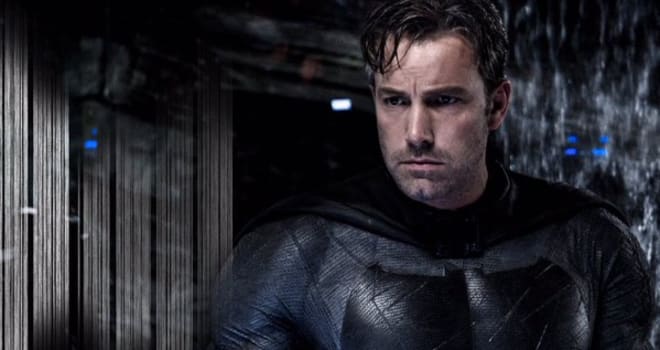![]()
For once, we have an
Oscar race with some actual suspense.
Last year, "
Boyhood" and "
Birdman" went neck-and-neck for most of awards season, but by the home stretch, the results were easy to predict if you were paying attention. This year, with
three strong contenders for Best Picture, guessing who'll go home with trophies on Sunday is that much harder.
Nonetheless, most of the acting categories, as well as a few others, have been pretty much locked down for months. Here, then, are my picks for who'll triumph at the 88th Academy Awards, based on research, many years spent covering the Oscars, and my gut feelings.
1. Best Original Song
Could this be the year that perennial Oscar also-ran
Diane Warren finally wins? After all, she's teamed with
Lady Gaga, who's been on a roll lately, in creating the tune "Til It Happens To You," from "
The Hunting Ground." Warren's strongest competitors are Sam Smith's "
Spectre" theme "Writing's on the Wall" and The Weeknd's "Earned It" (from "
Fifty Shades of Grey"), which just won him a Grammy. But that's probably not enough cover for the Academy to risk letting "Fifty Shades" go down in history as an Oscar-winning film. Smith's James Bond theme is as divisive as its movie. And the other two nominated songs are reportedly not being performed during the show, an indication that they're very long shots. So that means the eighth time will finally be the charm for Warren.
2. Best Original Score
![]()
Legendary Italian composer
Ennio Morricone has been nominated for six Oscars, but has yet to win one in competition. (He won an honorary Oscar in 2007.) His work on
Tarantino's "
The Hateful Eight" could finally right that wrong. Besides, the Academy will find it hard to resist the sentimental drama of the 87-year-old finally winning one the old-fashioned way.
3. Best Sound Editing
Typically, this award, which is for sound effects, goes to the loudest film. That's probably "
Mad Max: Fury Road."
4. Best Sound Mixing
![]()
This prize honors a movie's overall soundscape. This should go to the team from "
The Revenant," not just for their expert recreation of the sounds of the primeval wilderness, but also for the overall Academy love for the movie's technical achievements.
5. Best Visual Effects
This could be one of the voters' only chances to reward "
Star Wars: The Force Awakens." But voters may be more impressed by the effects from "Mad Max: Fury Road," created the old-school way, without (as much) digital trickery.
6. Best Makeup and Hairstyling
![]()
"The Revenant" has a shot for turning
Leonardo DiCaprio into a grizzled mountain man, but the "Mad Max" makeup team had to make a huge cast look creatively freakish, not just one star who's on-screen solo for much of the movie.
7. Best Costume Design
Before this contest, Sandy Powell had been nominated for this award 10 times and won three. She's competing against herself this year with nominations for both "
Carol" and "
Cinderella." (The other real contender is Jenny Beavan, for the inventively hideous outfits in "Fury Road.") As impeccable and sleek as Powell's costumes are for the 1950s period romance, the Academy likes lavish costumes, so expect Powell to win for the Disney ballroom fantasy.
8. Best Foreign Language Film
![]()
It's a horrible cliché, but the movie about the Holocaust tends to win. This year, that's Hungary's "
Son of Saul."
9. Best Live-Action Short
All the nominees this year are festival prize-winners with similar themes of the difficulties of cross-cultural communication. Consensus seems to favor "
Ave Maria," an international co-production about a noisy family of observant Jews trapped in a convent full of silent nuns. It's the most laugh-out-loud of the nominees; apparently, the Academy isn't so snobby about comedy when the movies are brief. Otherwise, the front-runner would be the more somber "
Day One," about an Army translator's unbelievably hectic first day on the job in Afghanistan.
10. Best Documentary Short
![]()
"
Body Team 12" is a timely, triumph-of-the-human-spirit account of Red Cross volunteers who collected the remains of Ebola victims during the recent outbreak in Liberia. It's been the favorite ever since it won the Documentary Short prize at the Tribeca Film Festival last spring.
11. Best Documentary Feature
"
Amy," the doc about the tragic life of singer Amy Winehouse, has been such a critical and commercial success that, for months, it's been the film to beat. Though "
What Happened, Miss Simone?" is hot on its heels.
12. Best Animated Short
!["Sanjay's Super Team" Comes to the Con â Director Sanjay Patel and producer Nicole Grindle are taking Pixar Animation Studios' new short to San Diego's Comic-Con International next month for its North American premiere and a peek behind the scenes of the production process. The Super Story Behind the Pixar Short "Sanjay's Super Team," slated for Thurs., July 9 at 11 a.m. in the Indigo Ballroom, Hilton Bayfront, reveals the unique inspiration for this incredibly personal film that features superheroes like never before. The short debuts in U.S. theaters in front of Disney-Pixar's "The Good Dinosaur" on Nov. 25, 2015.]()
As with the feature length cartoons, Disney and Pixar tend to win, so the obvious favorite is "
Sanjay's Super Team." But "
World of Tomorrow" is so devastatingly great that it ought to win on sheer merit. Besides, not everyone liked "Sanjay."
13. Best Animated Feature
"
Inside Out" has had the inside track on the prize since it opened last June. Yes, "
Anomalisa" is just as imaginative, but Pixar owns the home-field advantage in this category.
14. Best Production Design
![]()
Three of the five contenders just won prizes at the Art Directors Guild awards. The award for contemporary design went to "
The Martian," for its impressively realistic space station, while the award for period design went to "The Revenant," whose designer, Jack Fisk, has a distinguished 45-year-career but has yet to win an Oscar. Nonetheless, it's unlikely that the Academy will reward him this time for a movie that's set largely in an unspoiled wilderness. So that means the Oscar should go to the ADG fantasy winner, the imaginative sets for the post-apocalyptic nightmare of "Mad Max."
15. Best Cinematography
Poor
Roger Deakins. The "
Sicario" cinematographer is one of the great film artists of our time, and yet he's 0 for 12 at the Oscars. Not only is he going to lose again this year, but he's going to lose to the same man who beat him last year and the year before. It's unprecedented for someone to win this prize three times in a row, but "Revenant" cinematographer
Emmanuel "Chivo" Lubezki is going to do it.
16. Best Editing
![]()
For the sheer, headlong pace of it, the award should go to editor Margaret Sixel for "Fury Road." Besides, it won the American Cinema Editors' Eddie award -- a strong predictor of Oscar gold.
17. Best Adapted Screenplay
Adam McKay and
Charles Randolph should easily win for "
The Big Short," their deft adaptation of Michael Lewis' book about the 2008 financial collapse. Not only is it the only nominee that's based on a non-fiction book (and is therefore about a weighty historical topic), but it also managed to explain the complicated crisis in an easy-to-understand, humorous, outrageously entertaining way. Plus, it won the Writers Guild award. Its biggest rival is
Emma Donoghue's adaptation of her own novel, "
Room." Sad but true: no woman has ever won an Oscar for adapting her own source material.
18. Best Original Screenplay
![]()
"
Spotlight" has the advantage. The meticulous research, serious historical subject matter, and acting showcases for a vast ensemble have made it the leading contender. Also, it won the Writers Guild prize. And it may be the only chance Academy voters will get to reward the picture that was once the Best Picture front-runner. "Inside Out" is its closest competitor, but no animated film has ever won this prize.
19. Best Supporting Actress
This is the only acting category that's still a toss-up.
Kate Winslet won the Golden Globe and British Academy (BAFTA) prizes for "
Steve Jobs," a movie you might not have noticed she was in. Right now, the race is between her and
Alicia Vikander ("
The Danish Girl") , who won the more important precursor award from the Screen Actors Guild. Plus, this was a breakthrough year for her (six movies!), and honoring her performance here also means recognizing her for her lead role in "
Ex Machina" -- and for surviving unscathed the debacle that was "
The Man From U.N.C.L.E."
20. Best Supporting Actor
![]()
The sentimental favorite here is
Sylvester Stallone, nominated 39 years ago for creating Rocky Balboa, and nominated again this year for playing the boxer in twilight in "
Creed." Again, the sentimental vote factors in here, as it's hard to resist the emotional appeal of handing the 69-year-old Stallone his first acting Oscar.
21. Best Actress
Brie Larson's had this one locked up pretty much since "Room" started playing festivals last fall. As the captive mother fiercely protecting her unworldly son, and making a world for him inside a tiny cell, she both inspired and broke the hearts of pretty much everyone who's seen the movie.
22. Best Actor
![]()
This one has been Leo's to lose even before "The Revenant" opened. Maybe you're tired of hearing about all the hardships he endured during the shoot (he ate raw bison liver!), but even if you don't admire the effort, it's hard to argue with the results. More important, he's been nominated six times in 22 years but has yet to win. The whole town thinks he's due. So, DiCaprio will win this contest, as he has every prize he's been eligible for this winter.
23. Best Director
It's very rare for a director to win back-to-back Oscars. Only two men have done it, and the last was 65 years ago. Still,
Alejandro González Iñárritu pulled off the unprecedented feat of winning the Directors Guild Award twice in a row; that achievement alone makes him the man to beat. Iñárritu's only real rival is "Mad Max: Fury Road" director
George Miller, whose triumphant accomplishment in seeing his vision realized is just as impressive, and who, at age 70, has yet to win an Oscar despite a distinguished career. But sentiment can't overcome Iñárritu's momentum and the Academy's widespread "Revenant" love.
24. Best Picture
![]()
This is the toughest call this year, the category that's made the race so unpredictable and exciting for months. (Remember last fall, when "The Martian" and "Mad Max" were the favorites? Good times.)
At first, it looked like "Spotlight," with its prestige cast and subject matter, and Screen Actors Guild prize for Best Ensemble. But then "The Big Short" won the Producers Guild Award, the only major guild prize that uses a preferential ballot like the Academy's Best Picture category does, and the accurate predictor of the Academy vote for the last eight years. And then there's "The Revenant," which has earned a ton of money, grabbed the most Oscar nominations (12), and has momentum, with recent wins at the Directors Guild, Art Directors Guild, and BAFTAs. It's possible there'll be a split between the Directing and Picture categories, as there was in 2013 and 2014, but it doesn't happen that often. That, plus the Academy's bias against comedy and the film's low nominations tally (five), suggests that "Big Short" will get shorted.
The love for "Revenant" may not be deep, but it's broad, and it's consensus choices that win on the preferential ballot. If nothing else, "Revenant" feels like a grand achievement, something Oscar voters will feel good about having voted for years from now.
![the 11 most terrifying vampire movies ever made]()
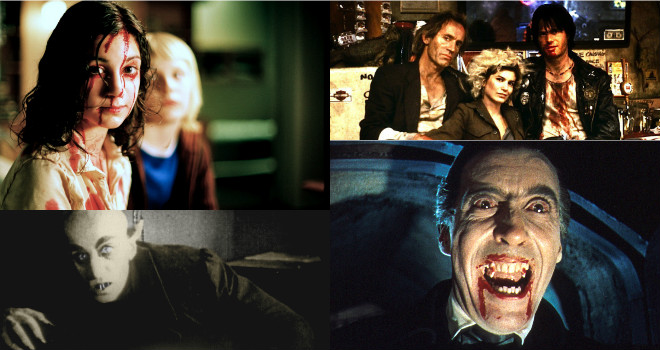
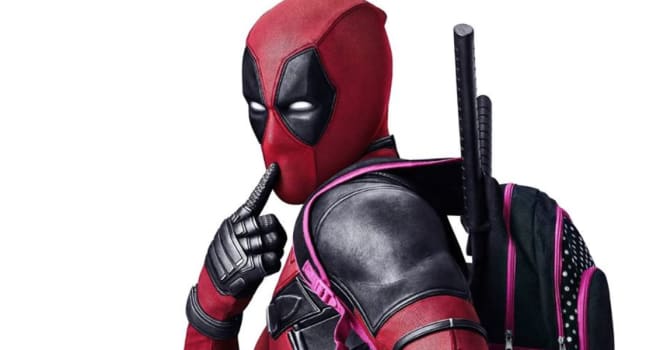 That
That 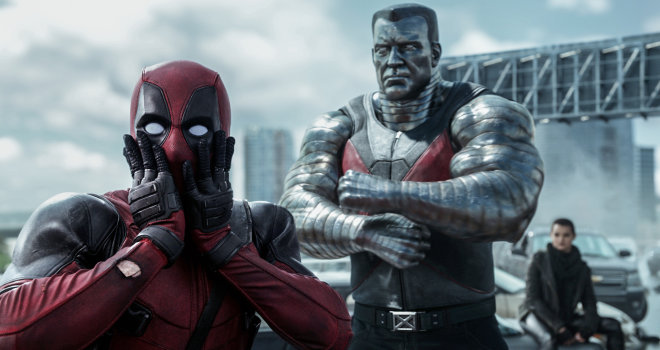 Truth is, the pundits have been off their game for at least a year when it comes to surprise blockbusters. They lowballed predictions for such 2015 hits as "
Truth is, the pundits have been off their game for at least a year when it comes to surprise blockbusters. They lowballed predictions for such 2015 hits as "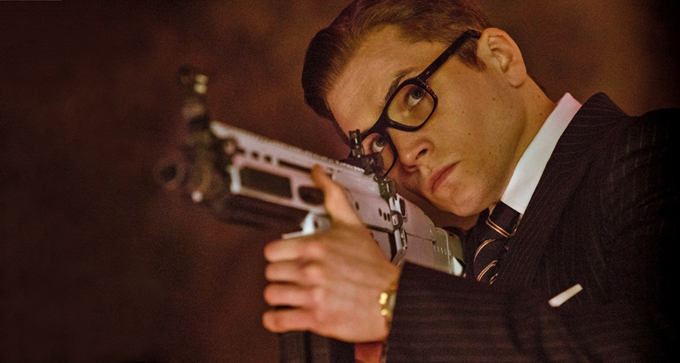 To date, there have been only a handful, most of them based on less-than-mainstream titles such as "300," "
To date, there have been only a handful, most of them based on less-than-mainstream titles such as "300," "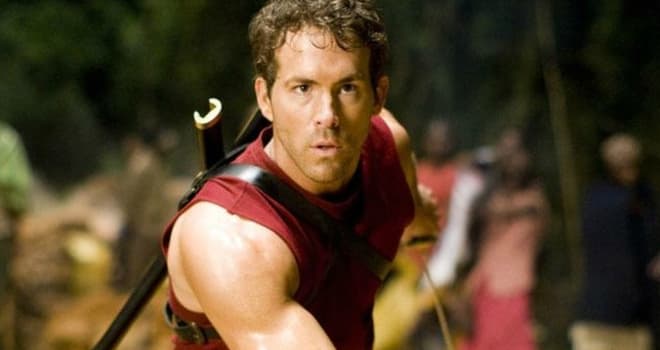 The former Green Lantern is generally considered talented, charming, and handsome, but he's never been a big box office draw. Most of his movies that opened well have done so with either Reynolds appearing in a rom-com, or playing second or third banana to a bigger star.
The former Green Lantern is generally considered talented, charming, and handsome, but he's never been a big box office draw. Most of his movies that opened well have done so with either Reynolds appearing in a rom-com, or playing second or third banana to a bigger star.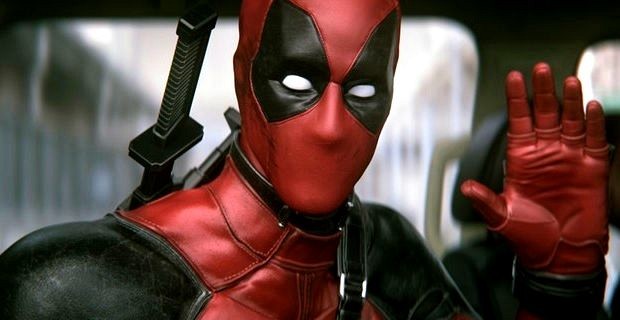 To attract the older audience it needs, it helps if an R-rated movie wins over the critics. "Deadpool" did, scoring an 82 percent rating at Rotten Tomatoes and 65 percent at Metacritic. "Deadpool" also earned an A from audiences at CinemaScore, indicating very strong word-of-mouth recommendations from viewers, both men and women.
To attract the older audience it needs, it helps if an R-rated movie wins over the critics. "Deadpool" did, scoring an 82 percent rating at Rotten Tomatoes and 65 percent at Metacritic. "Deadpool" also earned an A from audiences at CinemaScore, indicating very strong word-of-mouth recommendations from viewers, both men and women.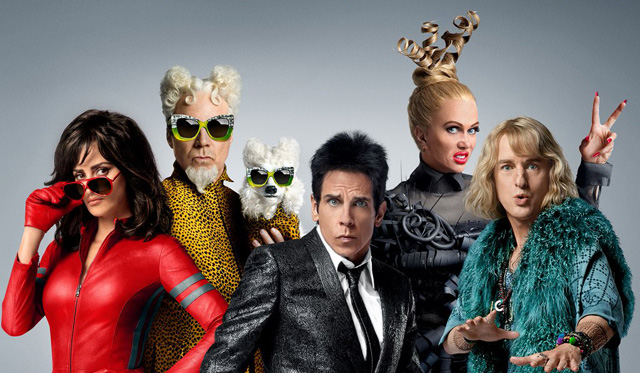 This weekend's other two new wide releases, "
This weekend's other two new wide releases, "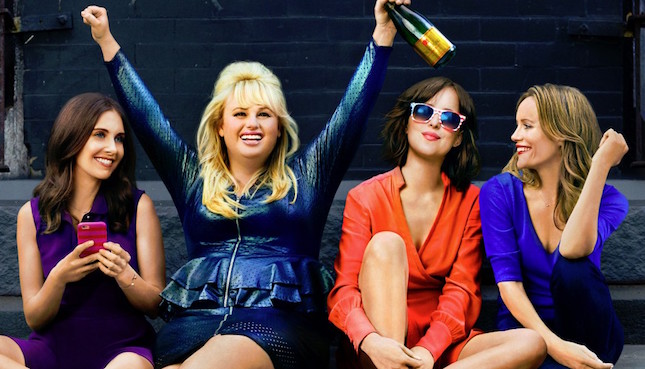 That's an accident of timing that's easily overlooked. But if it had fallen on a Friday, the romantic comedy "Single" would have made for a stronger date movie than it did with Valentine's Day coming at the end of the weekend. That also helped "Deadpool," which didn't have to worry about losing the couples audience on Friday night.
That's an accident of timing that's easily overlooked. But if it had fallen on a Friday, the romantic comedy "Single" would have made for a stronger date movie than it did with Valentine's Day coming at the end of the weekend. That also helped "Deadpool," which didn't have to worry about losing the couples audience on Friday night. Fox seems to have been teasing this movie for at least a year, with red-band trailers that played up the movie's humor, violence, and raunch. The message -- this is not your grandmother's superhero movie, unless your grandmother is
Fox seems to have been teasing this movie for at least a year, with red-band trailers that played up the movie's humor, violence, and raunch. The message -- this is not your grandmother's superhero movie, unless your grandmother is 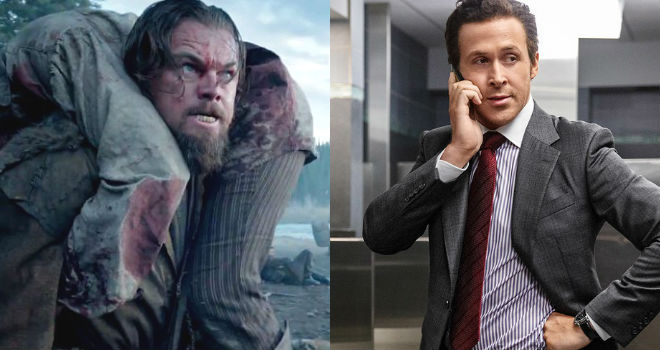 When it comes to
When it comes to 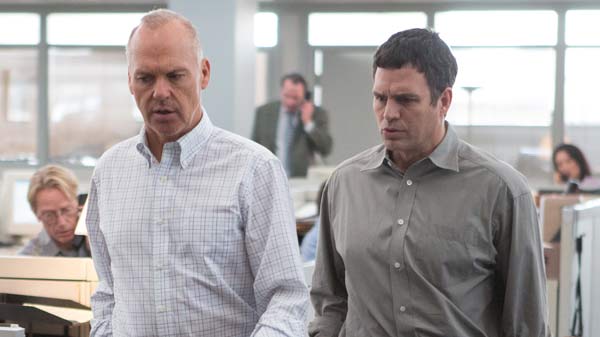 "
"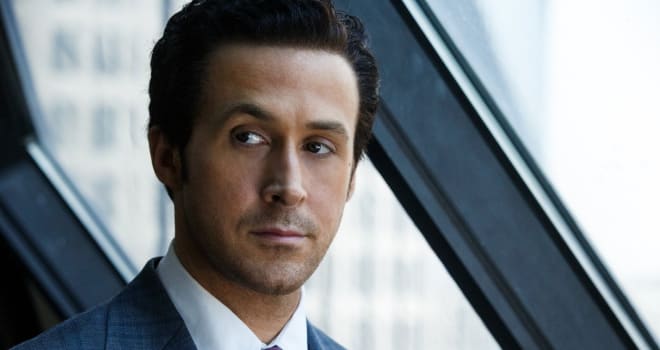 In the statistics-based reckoning, the BAFTAs usually don't figure at all. (The Hollywood-based Academy may love British actors and British movies, but do its voters really care what British film professionals choose as their favorites?) The American Academy has agreed with the British one on Best Film only 26 out of 68 times. In the recent past -- in the years since the BAFTAs moved their ceremony to precede the Oscars -- the BAFTAs anticipated the Oscar winner for Best Picture eight out of 15 times. The Brits have called six of the last seven Best Picture Oscar contests correctly; the only one they got wrong was last year's when
In the statistics-based reckoning, the BAFTAs usually don't figure at all. (The Hollywood-based Academy may love British actors and British movies, but do its voters really care what British film professionals choose as their favorites?) The American Academy has agreed with the British one on Best Film only 26 out of 68 times. In the recent past -- in the years since the BAFTAs moved their ceremony to precede the Oscars -- the BAFTAs anticipated the Oscar winner for Best Picture eight out of 15 times. The Brits have called six of the last seven Best Picture Oscar contests correctly; the only one they got wrong was last year's when 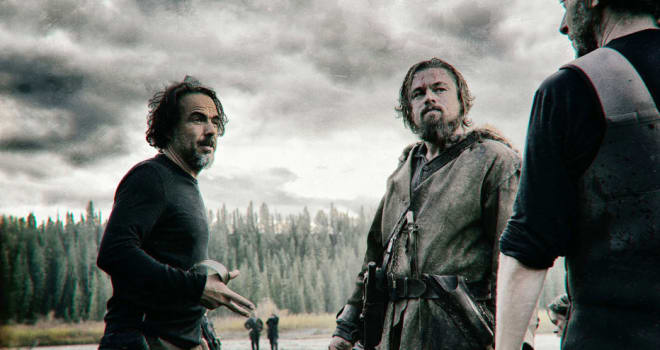 Sure, "Big Short" has the all-important PGA victory. But it doesn't have momentum, having lost big at the SAGs, the DGA, and BAFTAs (where it picked up only the writing prize out of its five nominations). "Spotlight" won at the SAGs, but that was three weeks ago. Since then, it's won the two writing awards, but otherwise, not much momentum there, either.
Sure, "Big Short" has the all-important PGA victory. But it doesn't have momentum, having lost big at the SAGs, the DGA, and BAFTAs (where it picked up only the writing prize out of its five nominations). "Spotlight" won at the SAGs, but that was three weeks ago. Since then, it's won the two writing awards, but otherwise, not much momentum there, either.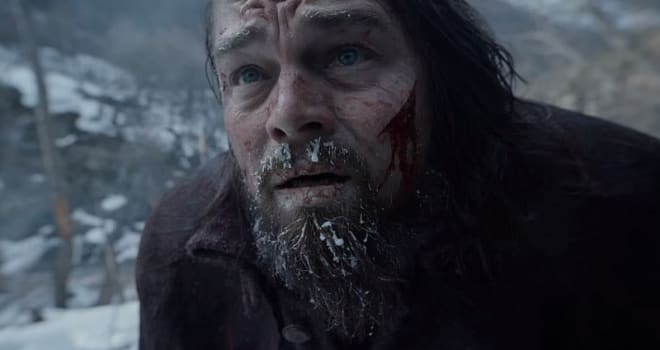 Iñárritu now seems a lock for Best Director, but there's still a chance that "Big Short" or (less likely) "Spotlight" might win Best Picture. It's just a matter of whether the strong statistics in those movies' favor are stronger than the wave of awards love that "Revenant" is currently riding.
Iñárritu now seems a lock for Best Director, but there's still a chance that "Big Short" or (less likely) "Spotlight" might win Best Picture. It's just a matter of whether the strong statistics in those movies' favor are stronger than the wave of awards love that "Revenant" is currently riding.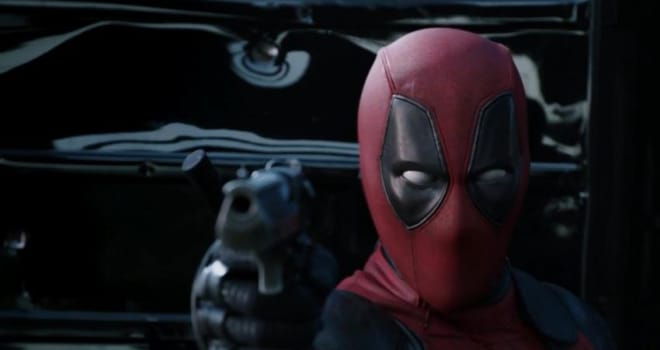 No one expects much to happen at the box office in February. And that's how we get a surprise smash like "
No one expects much to happen at the box office in February. And that's how we get a surprise smash like "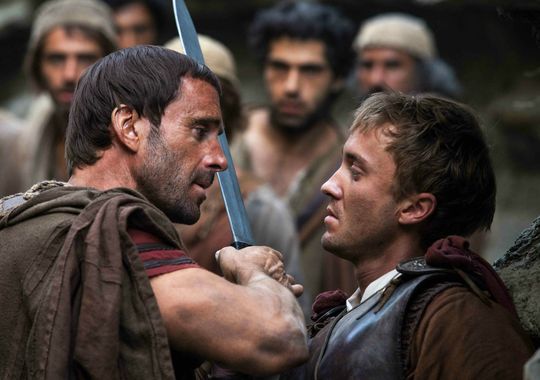 "
"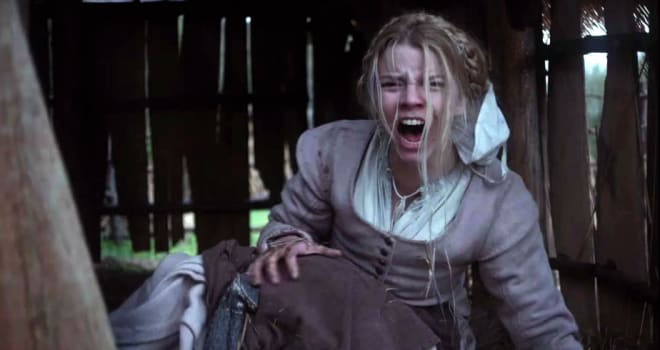 All that acclaim is unusual for a horror film, and it led indie distributor A24 to go all out with its first big wide release for "The Witch." Opening on 2,045 screens, "Witch" earned an estimated $8.7 million, good for fourth place. It also had the best per-screen average ($4,245) of any new wide release this weekend. Paradoxically, "Witch" didn't impress ticketbuyers nearly as much as it did the critics; it earned a poor grade (C-) at CinemaScore. Guess the chilly atmospherics that impressed the reviewers didn't do much for a horror audience that prefers frequent jolts and gore.
All that acclaim is unusual for a horror film, and it led indie distributor A24 to go all out with its first big wide release for "The Witch." Opening on 2,045 screens, "Witch" earned an estimated $8.7 million, good for fourth place. It also had the best per-screen average ($4,245) of any new wide release this weekend. Paradoxically, "Witch" didn't impress ticketbuyers nearly as much as it did the critics; it earned a poor grade (C-) at CinemaScore. Guess the chilly atmospherics that impressed the reviewers didn't do much for a horror audience that prefers frequent jolts and gore.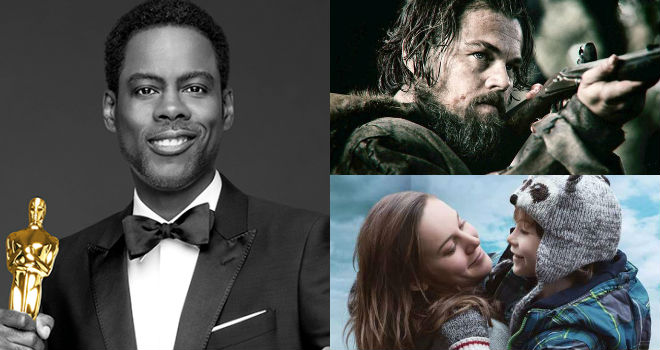
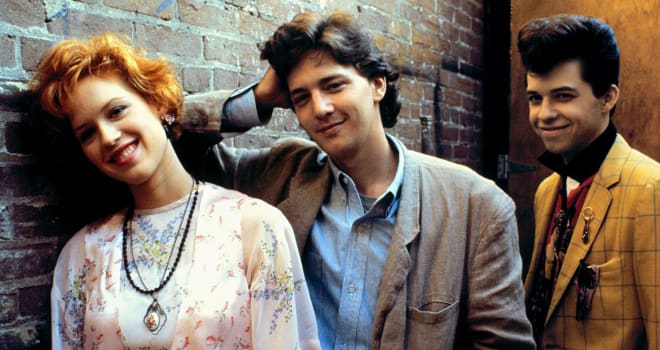 Thirty years have passed since the release of "
Thirty years have passed since the release of "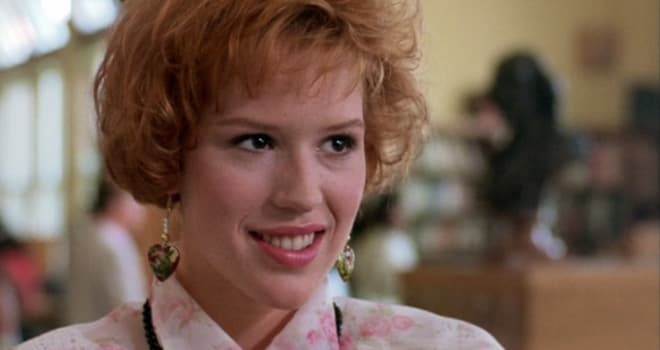 1. Hughes wrote the role of Andie Walsh for Ringwald, but even though she'd starred in his hits "
1. Hughes wrote the role of Andie Walsh for Ringwald, but even though she'd starred in his hits "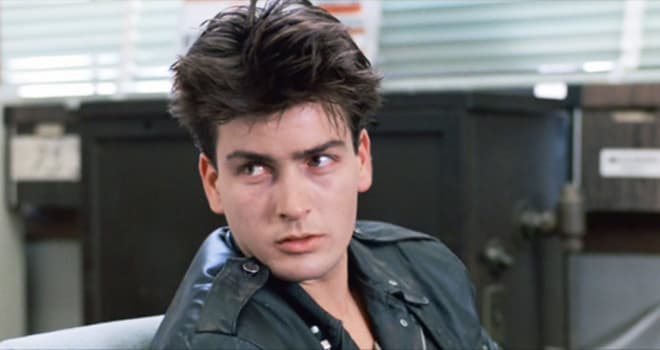 3. Hughes and Deutch almost chose the then-little-known
3. Hughes and Deutch almost chose the then-little-known 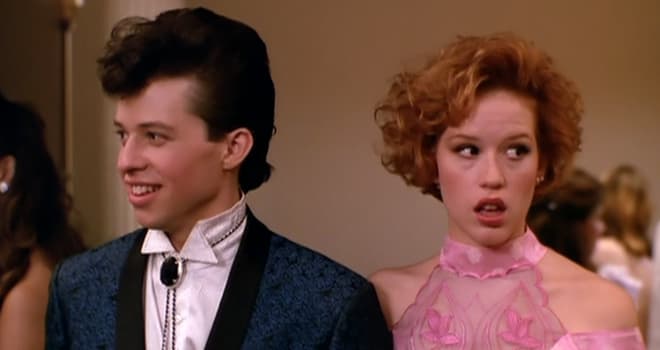 5. Cryer (pictured left) was not Ringwald's ideal Duckie. She wanted
5. Cryer (pictured left) was not Ringwald's ideal Duckie. She wanted 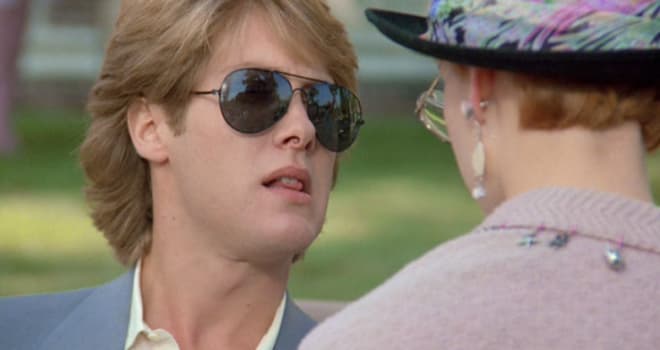 7.
7. 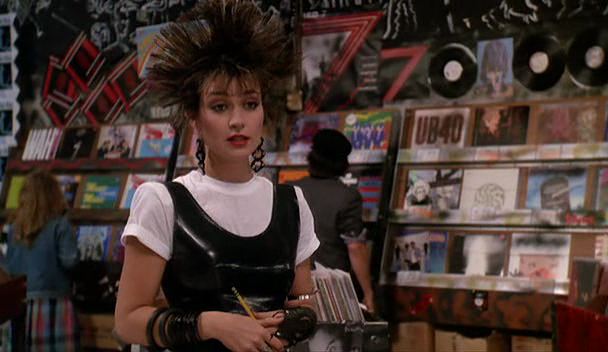 9. Hughes ultimately chose
9. Hughes ultimately chose 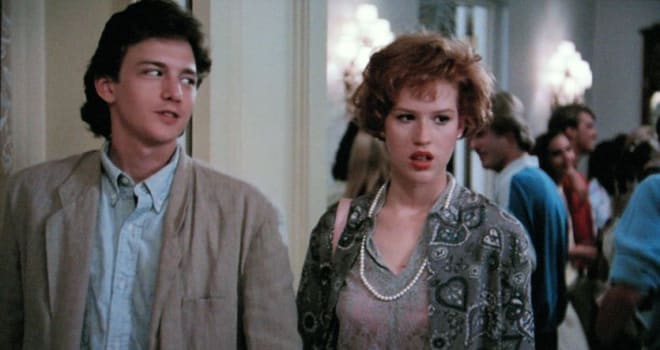 11. As most "Pink" fans know, the film originally ended with Andie and Duckie getting together, but test audiences rejected that ending, so McCarthy had to return well after the film wrapped to shoot an Andie-and-Blane ending.
11. As most "Pink" fans know, the film originally ended with Andie and Duckie getting together, but test audiences rejected that ending, so McCarthy had to return well after the film wrapped to shoot an Andie-and-Blane ending.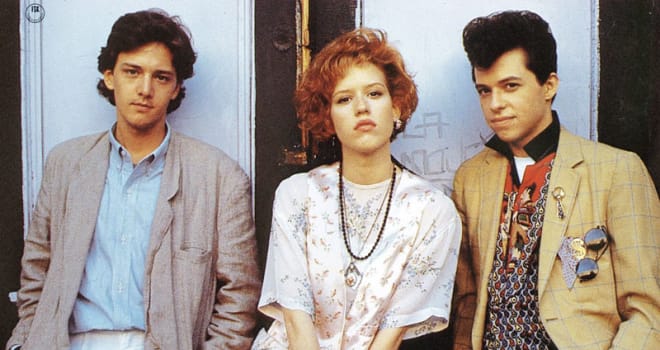 14. Other now-classic songs composed for the movie include Suzanne Vega's "Left of Center," New Order's "Shellshock," and Echo and the Bunnymen's "Bring on the Dancing Horses."
14. Other now-classic songs composed for the movie include Suzanne Vega's "Left of Center," New Order's "Shellshock," and Echo and the Bunnymen's "Bring on the Dancing Horses."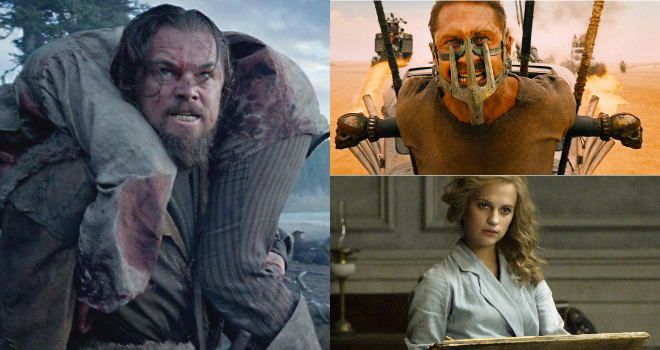 The ballots are in and on Sunday, the
The ballots are in and on Sunday, the 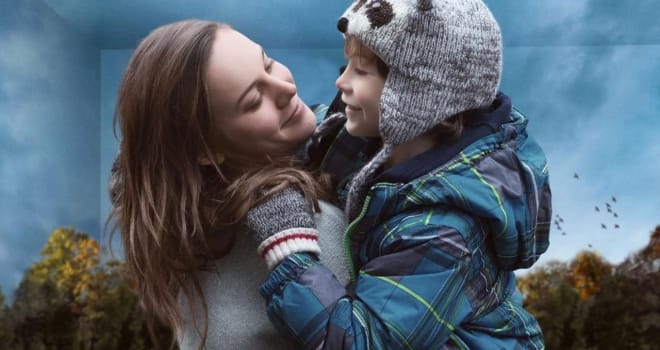 Voting may have ended on Tuesday, Feb. 23, but groups will keep handing out precursor awards -- the Costume Designers Guild, the Motion Picture Sound Editors, the Independent Spirits, even the Razzies -- all handed out after it's too late for them to influence the Oscar balloting. There's a nice irony in the notion that
Voting may have ended on Tuesday, Feb. 23, but groups will keep handing out precursor awards -- the Costume Designers Guild, the Motion Picture Sound Editors, the Independent Spirits, even the Razzies -- all handed out after it's too late for them to influence the Oscar balloting. There's a nice irony in the notion that 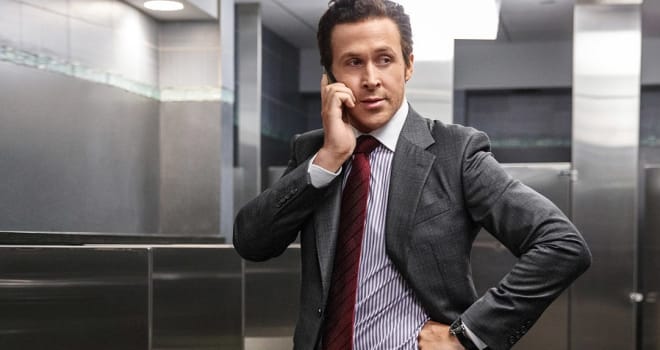 That's the famous line about Hollywood attributed to screenwriter William Goldman. It's true about Oscar forecasts as well.
That's the famous line about Hollywood attributed to screenwriter William Goldman. It's true about Oscar forecasts as well. "Revenant" is a big hit ($166 million earned to date in North America), but not as big as "
"Revenant" is a big hit ($166 million earned to date in North America), but not as big as "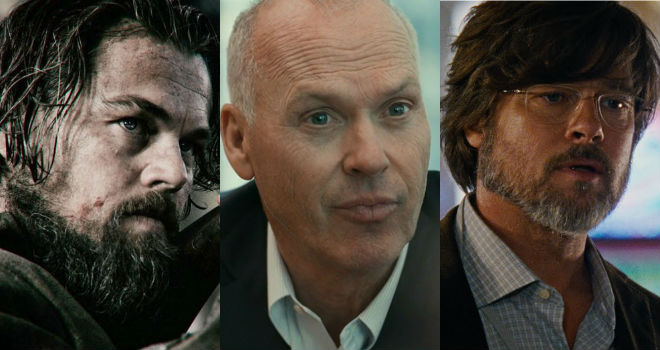 Yes, there have been complaints about
Yes, there have been complaints about 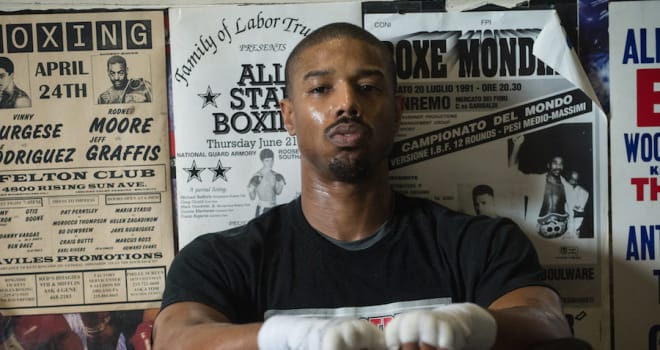 Think about this: More black performers were nominated in 1940 (the year
Think about this: More black performers were nominated in 1940 (the year 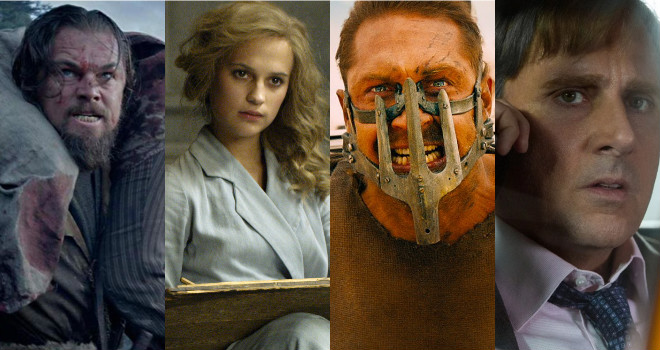 For once, we have an
For once, we have an 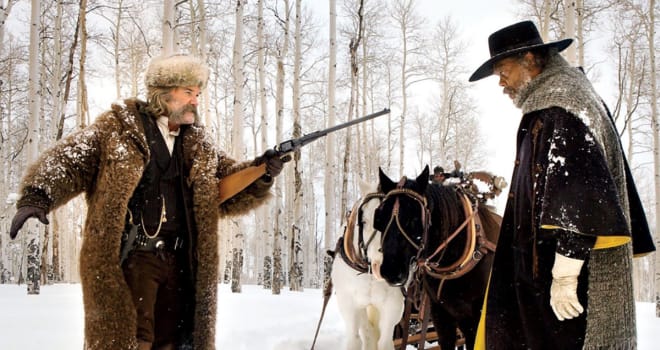 Legendary Italian composer
Legendary Italian composer 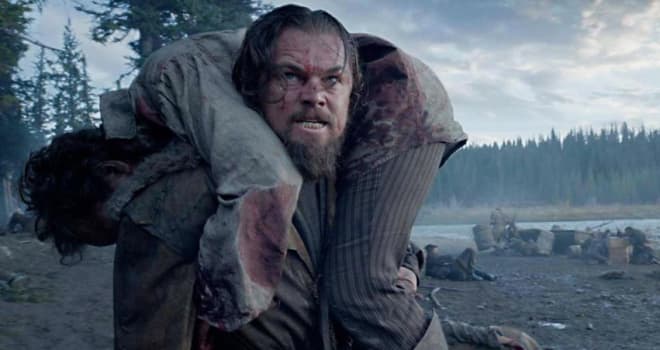 This prize honors a movie's overall soundscape. This should go to the team from "
This prize honors a movie's overall soundscape. This should go to the team from "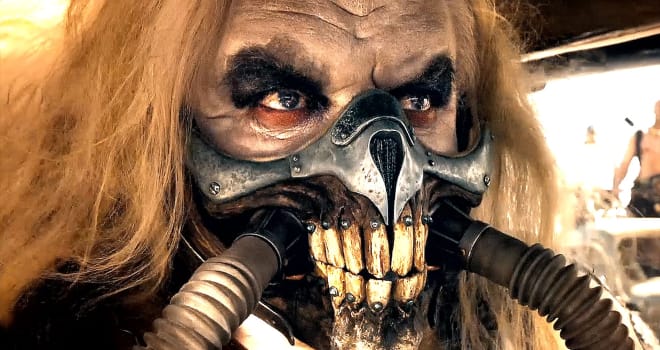 "The Revenant" has a shot for turning
"The Revenant" has a shot for turning 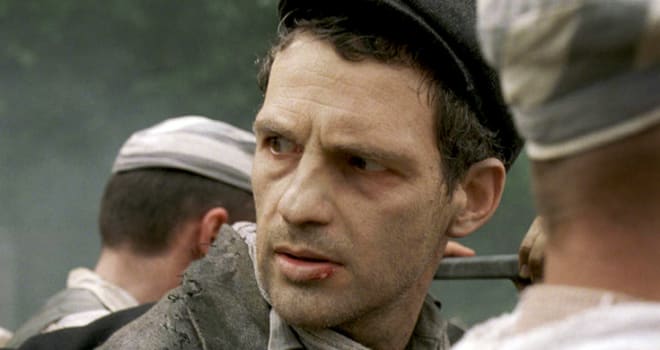 It's a horrible cliché, but the movie about the Holocaust tends to win. This year, that's Hungary's "
It's a horrible cliché, but the movie about the Holocaust tends to win. This year, that's Hungary's " "
" As with the feature length cartoons, Disney and Pixar tend to win, so the obvious favorite is "
As with the feature length cartoons, Disney and Pixar tend to win, so the obvious favorite is "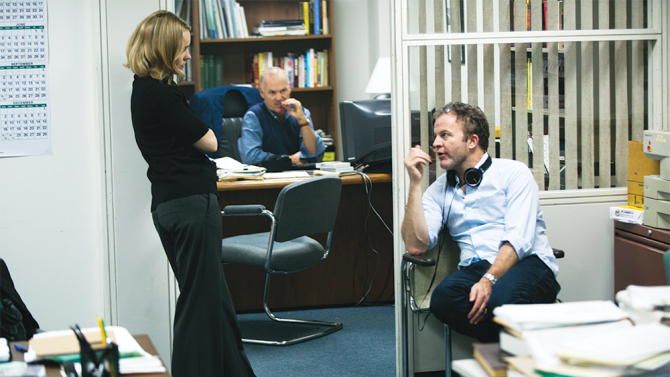 "
"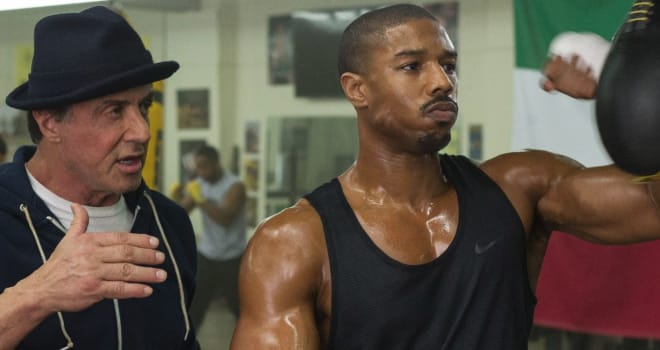 The sentimental favorite here is
The sentimental favorite here is 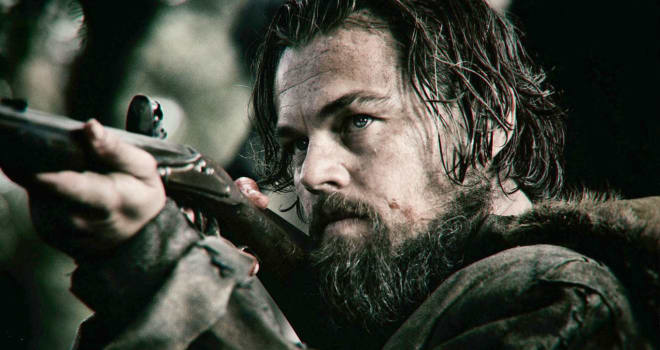 This one has been Leo's to lose even before "The Revenant" opened. Maybe you're tired of hearing about all the hardships he endured during the shoot (he ate raw bison liver!), but even if you don't admire the effort, it's hard to argue with the results. More important, he's been nominated six times in 22 years but has yet to win. The whole town thinks he's due. So, DiCaprio will win this contest, as he has every prize he's been eligible for this winter.
This one has been Leo's to lose even before "The Revenant" opened. Maybe you're tired of hearing about all the hardships he endured during the shoot (he ate raw bison liver!), but even if you don't admire the effort, it's hard to argue with the results. More important, he's been nominated six times in 22 years but has yet to win. The whole town thinks he's due. So, DiCaprio will win this contest, as he has every prize he's been eligible for this winter.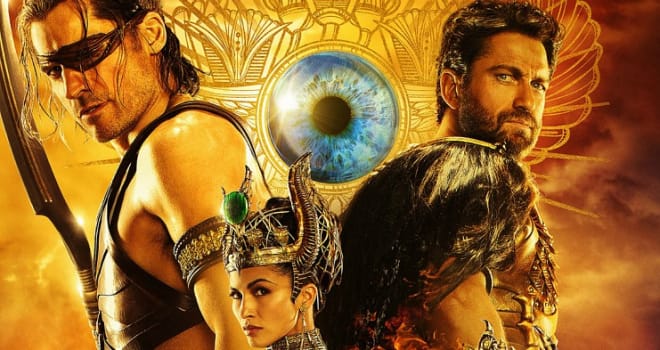 Forget "
Forget "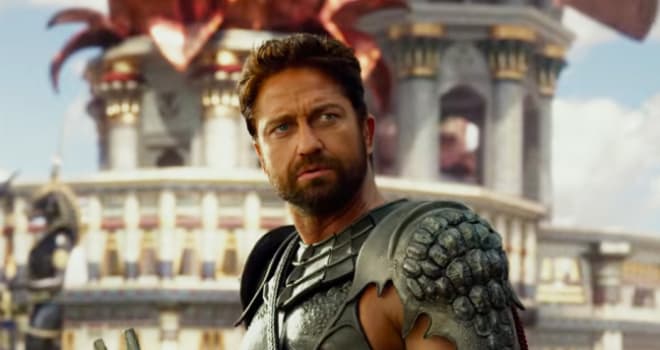
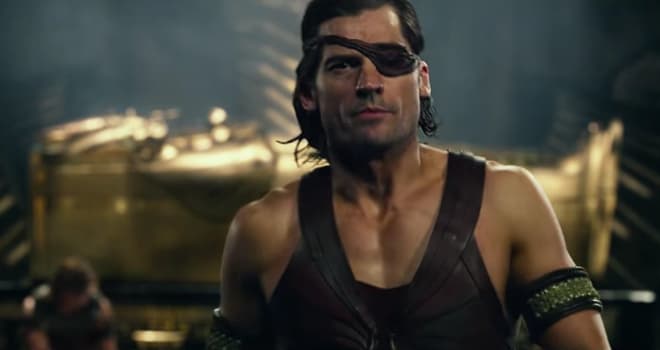 This was the even bigger problem with the casting: that the main roles were almost entirely played by white actors. It's not just an #OscarsSoWhite thing; the time seems to have passed when you could get away with casting an Egyptian story with so few brown performers in it.
This was the even bigger problem with the casting: that the main roles were almost entirely played by white actors. It's not just an #OscarsSoWhite thing; the time seems to have passed when you could get away with casting an Egyptian story with so few brown performers in it.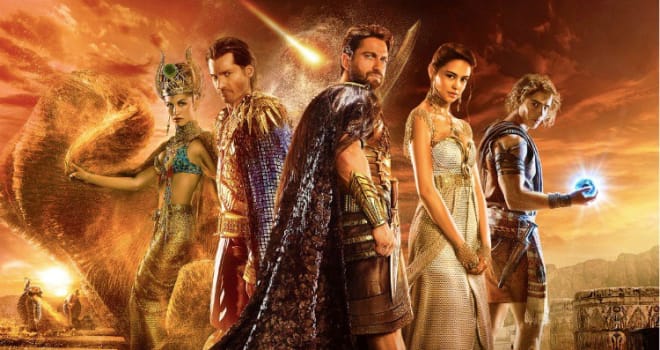 How did Lionsgate think this was going to be the next "Hunger Games" or "Divergent?" Two things those franchises had in common: they were based on best-selling book series, and they had likable teenage-girl heroines. "Gods" has no literary pedigree and is pretty much a sausage fest.
How did Lionsgate think this was going to be the next "Hunger Games" or "Divergent?" Two things those franchises had in common: they were based on best-selling book series, and they had likable teenage-girl heroines. "Gods" has no literary pedigree and is pretty much a sausage fest.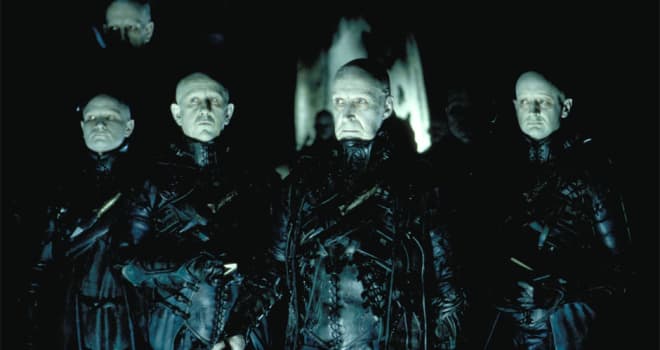 Alex Proyas used to be considered a truly visionary director, thanks to cult hits "
Alex Proyas used to be considered a truly visionary director, thanks to cult hits "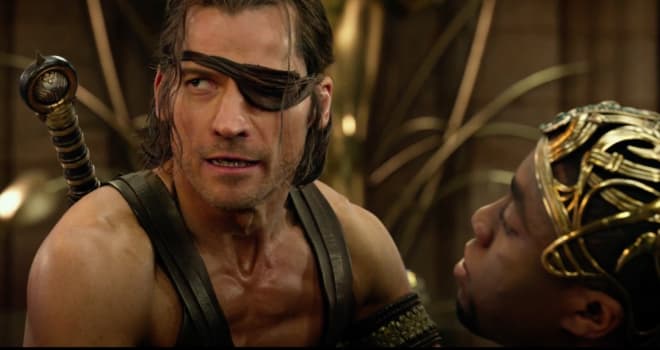 With a team like that, it's no wonder that "Gods of Egypt" received such dismal reviews (13 percent fresh at Rotten Tomatoes, 24 at Metacritic). But even audiences gave it poor word-of-mouth, judging by the film's B- grade at CinemaScore.
With a team like that, it's no wonder that "Gods of Egypt" received such dismal reviews (13 percent fresh at Rotten Tomatoes, 24 at Metacritic). But even audiences gave it poor word-of-mouth, judging by the film's B- grade at CinemaScore.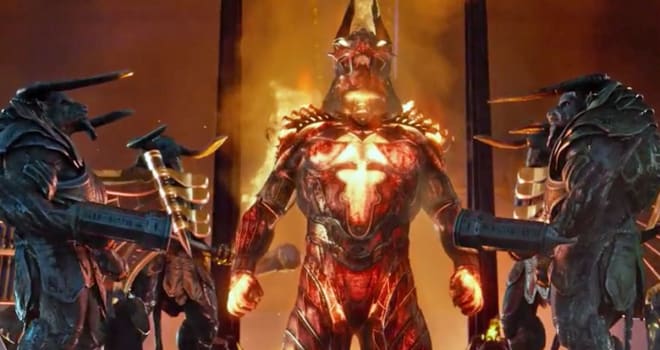 No doubt Lionsgate was hoping that the movie's 3D bookings would bring in more money, but by many accounts, "Gods"' visuals weren't that impressive -- with creatures and sets that would have been more at home in a video game than on the giant screen. American audiences have shown that they're not willing to pay extra for 3D unless the movie offers a real treat for the eye.
No doubt Lionsgate was hoping that the movie's 3D bookings would bring in more money, but by many accounts, "Gods"' visuals weren't that impressive -- with creatures and sets that would have been more at home in a video game than on the giant screen. American audiences have shown that they're not willing to pay extra for 3D unless the movie offers a real treat for the eye.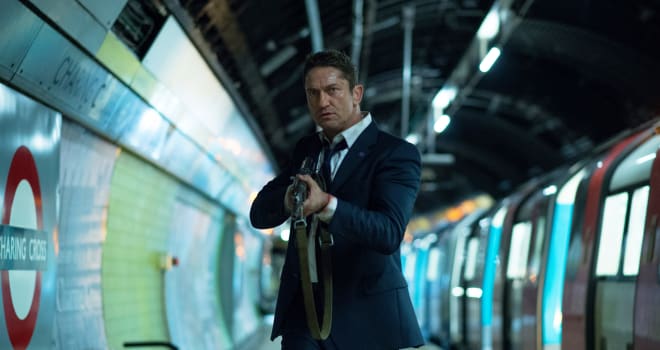 Not only was positioning the movie a week before Butler's "London Has Fallen" (above) a bad idea, but so was putting it in the sights of "Deadpool," which earned another estimated $31.5 million this weekend. In fairness, everyone underestimated "Deadpool." Still, when action/fantasy fans have a choice between a contemporary Marvel superhero movie and an unfamiliar adventure set in the ancient world, it's not hard to guess which one they'll pick.
Not only was positioning the movie a week before Butler's "London Has Fallen" (above) a bad idea, but so was putting it in the sights of "Deadpool," which earned another estimated $31.5 million this weekend. In fairness, everyone underestimated "Deadpool." Still, when action/fantasy fans have a choice between a contemporary Marvel superhero movie and an unfamiliar adventure set in the ancient world, it's not hard to guess which one they'll pick.
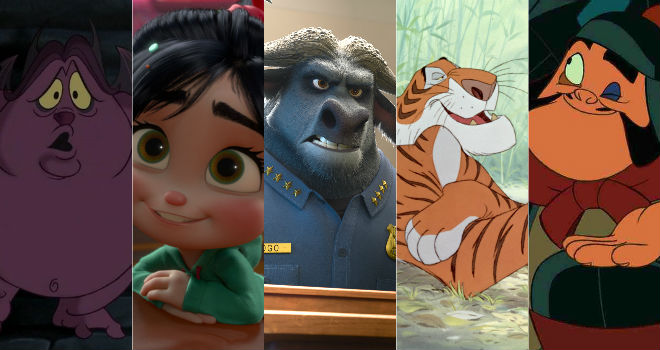

 At times, while directing
At times, while directing  1. "Birdcage" was already the seventh incarnation of the story, which started out as the French play "La Cage aux Folles" in 1973. It became a celebrated international film hit in 1978, spawned two movie sequels, a failed American TV pilot (called "Adam and Yves"), and then a hit Broadway musical in 1983. But Nichols' film was the first version to transplant the story to an American setting and insert topical political jokes.
1. "Birdcage" was already the seventh incarnation of the story, which started out as the French play "La Cage aux Folles" in 1973. It became a celebrated international film hit in 1978, spawned two movie sequels, a failed American TV pilot (called "Adam and Yves"), and then a hit Broadway musical in 1983. But Nichols' film was the first version to transplant the story to an American setting and insert topical political jokes. 3. Originally, the movie was to star
3. Originally, the movie was to star  5. The songs performed in the film are original or previously unheard songs by no less than Stephen Sondheim. The Broadway legend composed "Little Dream" (the song Albert sings in rehearsal) for the movie, and he gave the filmmakers two other songs cut from some of his acclaimed stage musicals. The song "Can That Boy Foxtrot," which Albert sings in the club, was a tune cut from Sondheim's "Follies." And "Love Is in the Air," sung by Armand and Katherine (
5. The songs performed in the film are original or previously unheard songs by no less than Stephen Sondheim. The Broadway legend composed "Little Dream" (the song Albert sings in rehearsal) for the movie, and he gave the filmmakers two other songs cut from some of his acclaimed stage musicals. The song "Can That Boy Foxtrot," which Albert sings in the club, was a tune cut from Sondheim's "Follies." And "Love Is in the Air," sung by Armand and Katherine ( 7. Playing a character who is supposed to be an 18-year-old college student, Flockhart was actually 30 at the time of filming. The exposure she earned from "The Birdcage" helped her land her star-making TV role on "
7. Playing a character who is supposed to be an 18-year-old college student, Flockhart was actually 30 at the time of filming. The exposure she earned from "The Birdcage" helped her land her star-making TV role on " 9. The film cost a reported $31 million to make. It opened at No. 1 on the box office with $18.3 million, a record at the time for a movie with an openly gay protagonist. (That record stood for 13 years, until broken by "
9. The film cost a reported $31 million to make. It opened at No. 1 on the box office with $18.3 million, a record at the time for a movie with an openly gay protagonist. (That record stood for 13 years, until broken by " This was the weekend that adults came back to the multiplex. And, for the most part, what brought them back was a Disney movie about a city of talking animals.
This was the weekend that adults came back to the multiplex. And, for the most part, what brought them back was a Disney movie about a city of talking animals. Disney also smartly marketed the movie to grown-ups, by attaching trailers to "
Disney also smartly marketed the movie to grown-ups, by attaching trailers to " Has it really been 20 years since the release of "
Has it really been 20 years since the release of " 1. The opening title card claims the movie is based on a true story, but in fact, it's almost completely fictional. There was, however, a real-life crime with some superficial similarities. The victim was Helle Crafts, a Connecticut woman who disappeared in 1986. Her husband was ultimately convicted of her murder; investigators determined that he'd used a wood chipper to destroy her remains.
1. The opening title card claims the movie is based on a true story, but in fact, it's almost completely fictional. There was, however, a real-life crime with some superficial similarities. The victim was Helle Crafts, a Connecticut woman who disappeared in 1986. Her husband was ultimately convicted of her murder; investigators determined that he'd used a wood chipper to destroy her remains.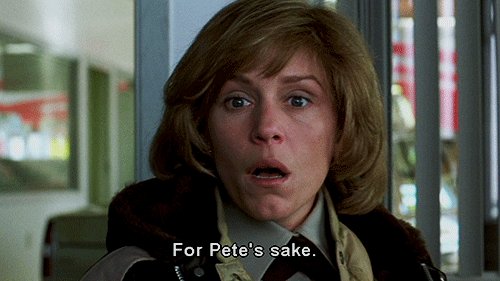 3. McDormand became a mom shortly before filming began -- after a decade of marriage, she and Joel adopted a baby they named Pedro -- but her massive pregnancy bump in "Fargo" was a prosthetic, filled with birdseed. McDormand did research by meeting with an actual pregnant cop from the Twin Cities. "In St. Paul, I met Officer Nancy, who was seven months pregnant and still working," McDormand recalled at the time. "She was on the vice squad doing search and seizure. She was going to go into the office and do a desk job in the middle of her eighth month, but until then, she was still out there doing it."
3. McDormand became a mom shortly before filming began -- after a decade of marriage, she and Joel adopted a baby they named Pedro -- but her massive pregnancy bump in "Fargo" was a prosthetic, filled with birdseed. McDormand did research by meeting with an actual pregnant cop from the Twin Cities. "In St. Paul, I met Officer Nancy, who was seven months pregnant and still working," McDormand recalled at the time. "She was on the vice squad doing search and seizure. She was going to go into the office and do a desk job in the middle of her eighth month, but until then, she was still out there doing it."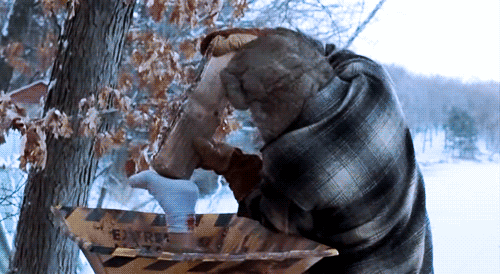 5. Distributor Gramercy drummed up interest among critics with a promotional gift: a snow globe encasing a diorama of the wood chipper scene, complete with bloody red flakes that would scatter when you shook the globe. By the way, the Fargo, N.D. visitor's center claims to have the wood chipper from the film
5. Distributor Gramercy drummed up interest among critics with a promotional gift: a snow globe encasing a diorama of the wood chipper scene, complete with bloody red flakes that would scatter when you shook the globe. By the way, the Fargo, N.D. visitor's center claims to have the wood chipper from the film  7. At the 1997 Oscars (above), McDormand won Best Actress, while the Coen brothers won Best Original Screenplay. Also nominated were Macy (for Best Supporting Actor), cinematographer Roger Deakins, Ethan (for Best Picture, as producer), Joel (for directing), and editor Roderick Jaynes. Since Jaynes was a pseudonym for the writer/director/producer brothers themselves, the Coens wanted to have their "
7. At the 1997 Oscars (above), McDormand won Best Actress, while the Coen brothers won Best Original Screenplay. Also nominated were Macy (for Best Supporting Actor), cinematographer Roger Deakins, Ethan (for Best Picture, as producer), Joel (for directing), and editor Roderick Jaynes. Since Jaynes was a pseudonym for the writer/director/producer brothers themselves, the Coens wanted to have their " 9. In 1997, 17 years before the FX series debuted, there was an early, failed attempt to launch a "Fargo" TV spinoff.
9. In 1997, 17 years before the FX series debuted, there was an early, failed attempt to launch a "Fargo" TV spinoff. 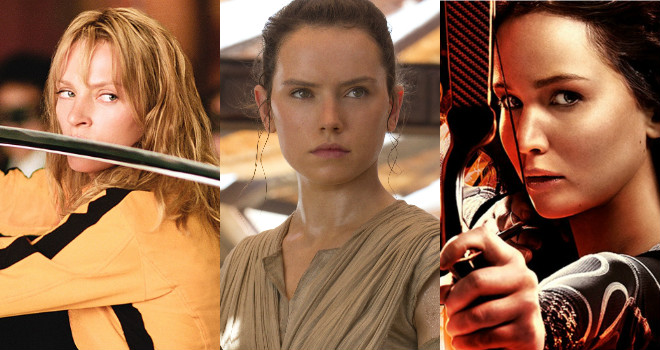
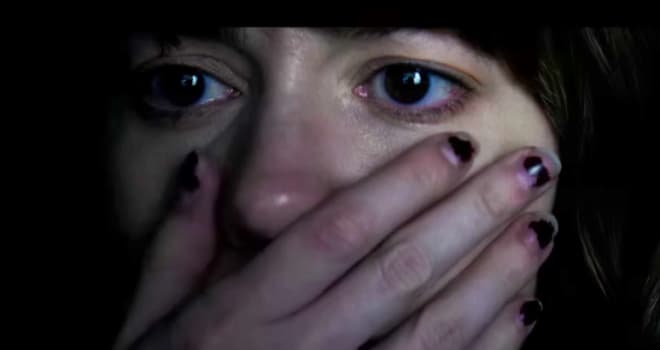 Two months ago, no one had heard of
Two months ago, no one had heard of  By now, the "
By now, the "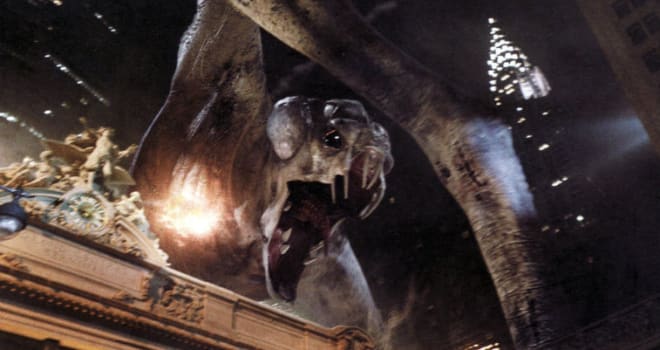 The 2008 found-footage monster movie helped make Abrams' reputation as a master of viral marketing, able to sneak up an audience with a movie thanks to his Mystery Box. When it was first advertised, no one knew what the movie was about, who was in it, or even what it was called -- until shortly before it appeared in theaters. The first trailer ended with a mic-drop of a last scene -- the Statue of Liberty's head rolling to a stop on a NYC street -- and a release date. That's it.
The 2008 found-footage monster movie helped make Abrams' reputation as a master of viral marketing, able to sneak up an audience with a movie thanks to his Mystery Box. When it was first advertised, no one knew what the movie was about, who was in it, or even what it was called -- until shortly before it appeared in theaters. The first trailer ended with a mic-drop of a last scene -- the Statue of Liberty's head rolling to a stop on a NYC street -- and a release date. That's it.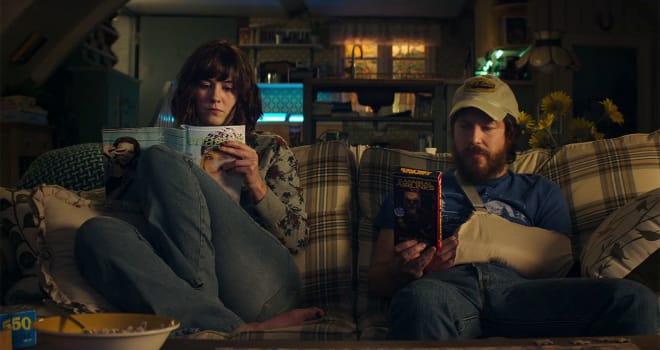 Abrams' movies are often a throwback to the kinds of films the 49-year-old enjoyed as a kid, whether it's the Spielbergian "
Abrams' movies are often a throwback to the kinds of films the 49-year-old enjoyed as a kid, whether it's the Spielbergian "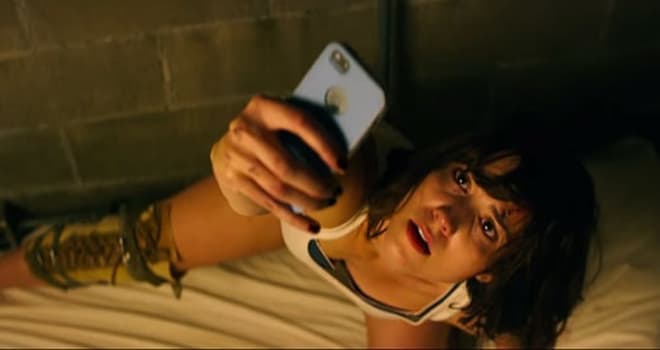 It's worth noting that the movie's predominantly male audience had no problem identifying with a strong, heroic female lead, played by Winstead. That's not a new idea to Abrams, whose multi-layered, hard-charging heroines range from Sydney Bristow in "
It's worth noting that the movie's predominantly male audience had no problem identifying with a strong, heroic female lead, played by Winstead. That's not a new idea to Abrams, whose multi-layered, hard-charging heroines range from Sydney Bristow in "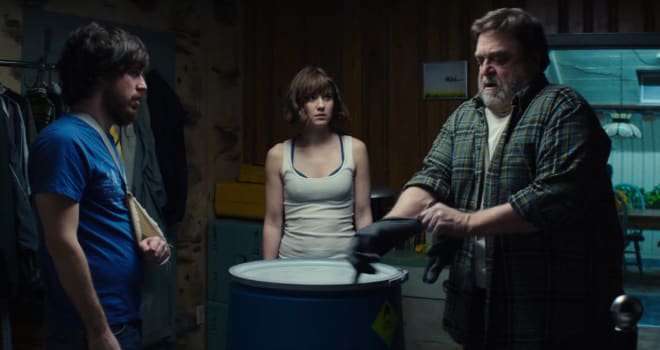 "10 Cloverfield Lane" was fortunate in its choice of competitors. Sure, it wasn't going to pose any threat to "Zootopia," but it wasn't really going after the same family audience anyway. And new releases "
"10 Cloverfield Lane" was fortunate in its choice of competitors. Sure, it wasn't going to pose any threat to "Zootopia," but it wasn't really going after the same family audience anyway. And new releases "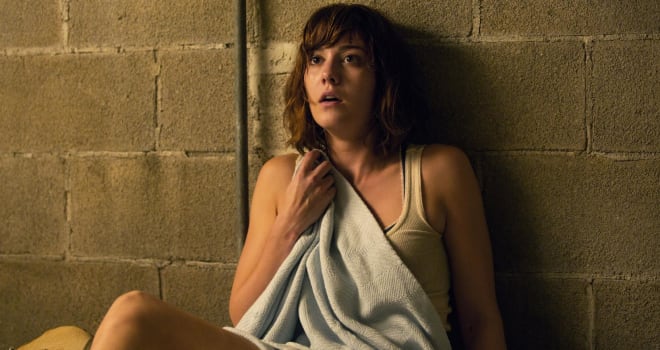 None of this would matter if viewers didn't think the movie delivered. Inevitably, some were disappointed with the twists and potentially mislead by the marketing campaign's "Cloverfield" tie-in, hence the B- CinemaScore. Audiences tend to give lower grades when they find something other than what was promised, or they expected. But again, expectations were low, so most critics and many ticketbuyers were pleasantly surprised.
None of this would matter if viewers didn't think the movie delivered. Inevitably, some were disappointed with the twists and potentially mislead by the marketing campaign's "Cloverfield" tie-in, hence the B- CinemaScore. Audiences tend to give lower grades when they find something other than what was promised, or they expected. But again, expectations were low, so most critics and many ticketbuyers were pleasantly surprised.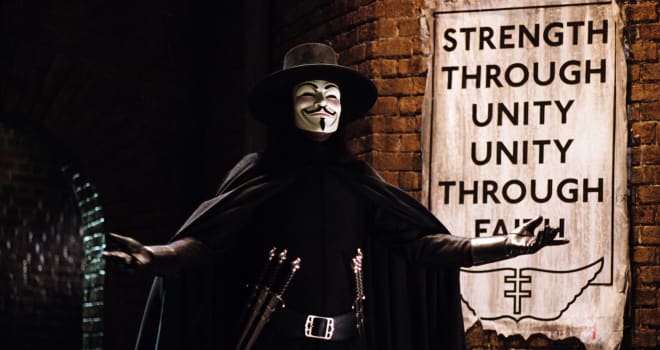 "
"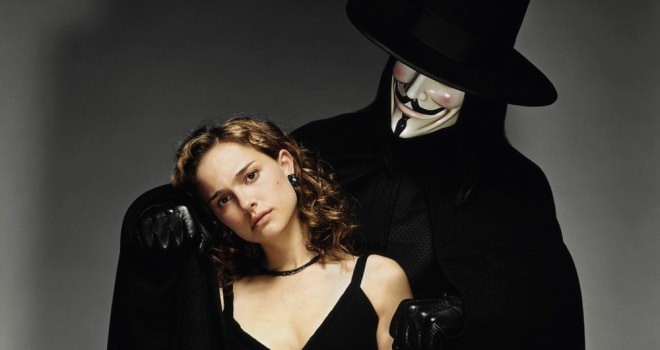 1. After making three "Matrix" movies, Andy and Larry Wachowski (now Lilly and Lana, respectively) dusted off a screenplay for "Vendetta" they'd written years earlier, before they had the clout to make it. Wanting a break from directing, they produced the film, but handed over the director's chair to
1. After making three "Matrix" movies, Andy and Larry Wachowski (now Lilly and Lana, respectively) dusted off a screenplay for "Vendetta" they'd written years earlier, before they had the clout to make it. Wanting a break from directing, they produced the film, but handed over the director's chair to 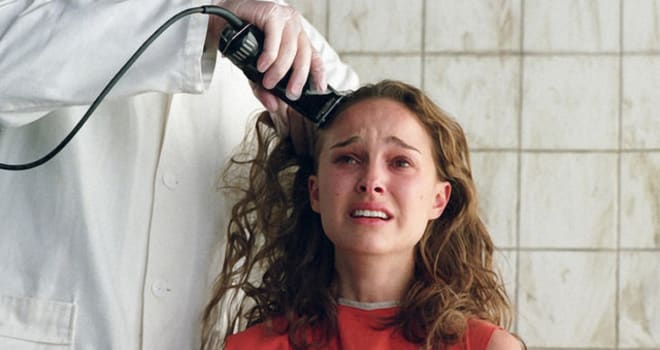 3. Portman, whose orphaned Evey is rescued and indoctrinated by V, gets her head shaved in the film. And Portman did indeed get shorn for real on camera.
3. Portman, whose orphaned Evey is rescued and indoctrinated by V, gets her head shaved in the film. And Portman did indeed get shorn for real on camera.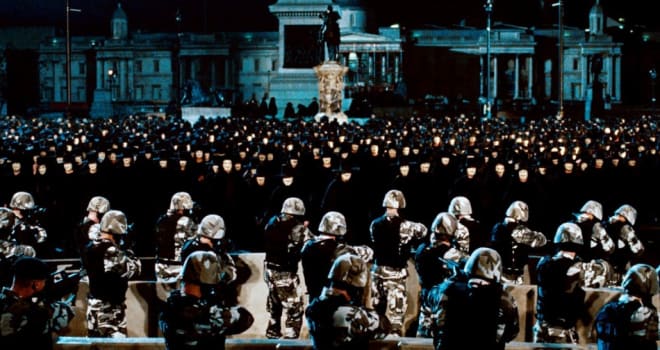 6. The movie's climax (pictured), involving thousands of masked rebels marching in London's Whitehall area, required the neighborhood to be cleared after midnight for four nights of filming. It was a first for the district, home to Trafalgar Square, the prime minister's residence and the Houses of Parliament. Co-star Stephen Fry joked that production assistant Euan Blair, son of then-prime minister Tony Blair, pulled strings to get the necessary clearances.
6. The movie's climax (pictured), involving thousands of masked rebels marching in London's Whitehall area, required the neighborhood to be cleared after midnight for four nights of filming. It was a first for the district, home to Trafalgar Square, the prime minister's residence and the Houses of Parliament. Co-star Stephen Fry joked that production assistant Euan Blair, son of then-prime minister Tony Blair, pulled strings to get the necessary clearances.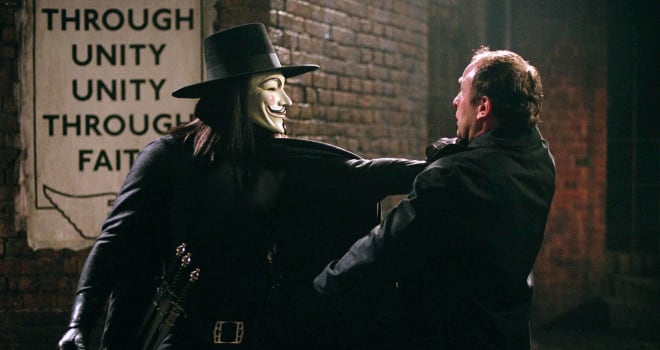 8. As he had with other movie projects based on his writings, including "
8. As he had with other movie projects based on his writings, including "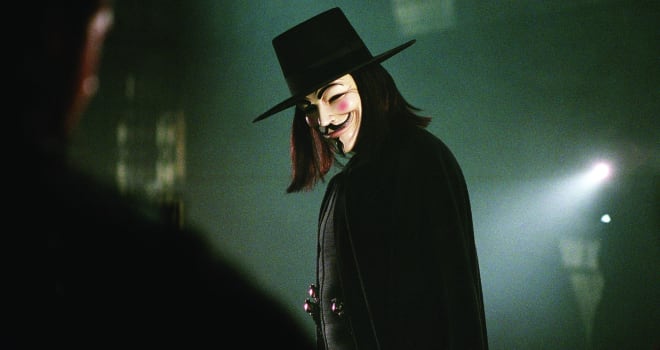 10. The Guy Fawkes masks Lloyd designed for the book -- and the film -- became a symbol and tool beloved by protesters the world over. They were especially prominent during
10. The Guy Fawkes masks Lloyd designed for the book -- and the film -- became a symbol and tool beloved by protesters the world over. They were especially prominent during 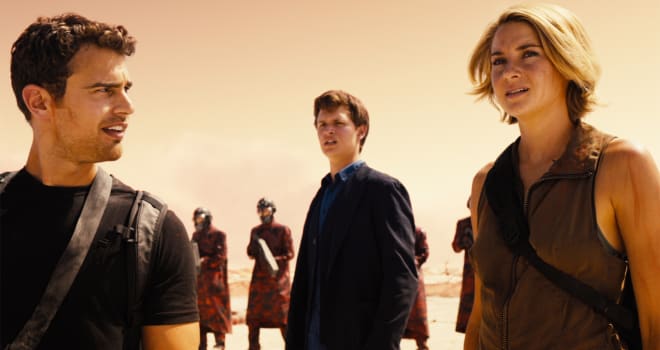 In its
In its 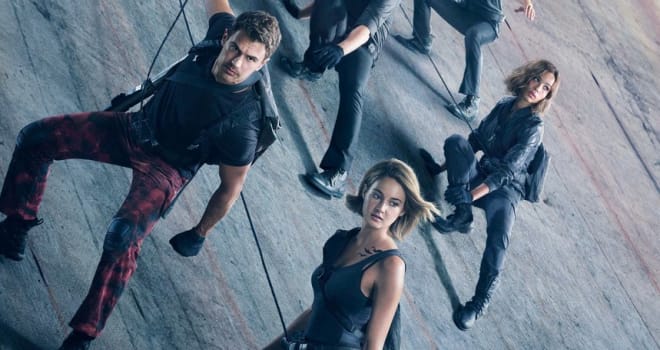 The tactic of splitting a franchise finale into two parts, which made some sense with the plot-heavy "
The tactic of splitting a franchise finale into two parts, which made some sense with the plot-heavy "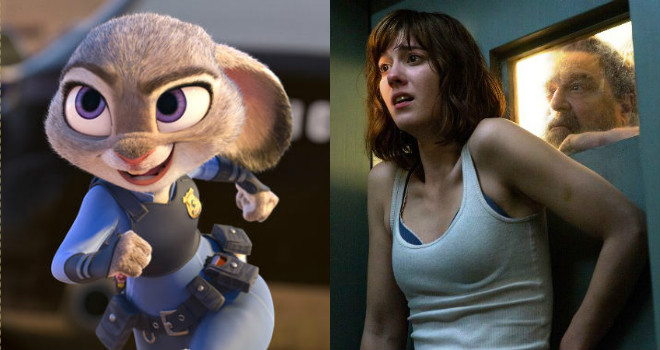 The third week in March may have worked well for the first two movies, but this time around, "Allegiant" ran into tough competition. There was "Zootopia," of course, which was built to appeal to older audiences -- as well as tots. There was also the new "
The third week in March may have worked well for the first two movies, but this time around, "Allegiant" ran into tough competition. There was "Zootopia," of course, which was built to appeal to older audiences -- as well as tots. There was also the new "